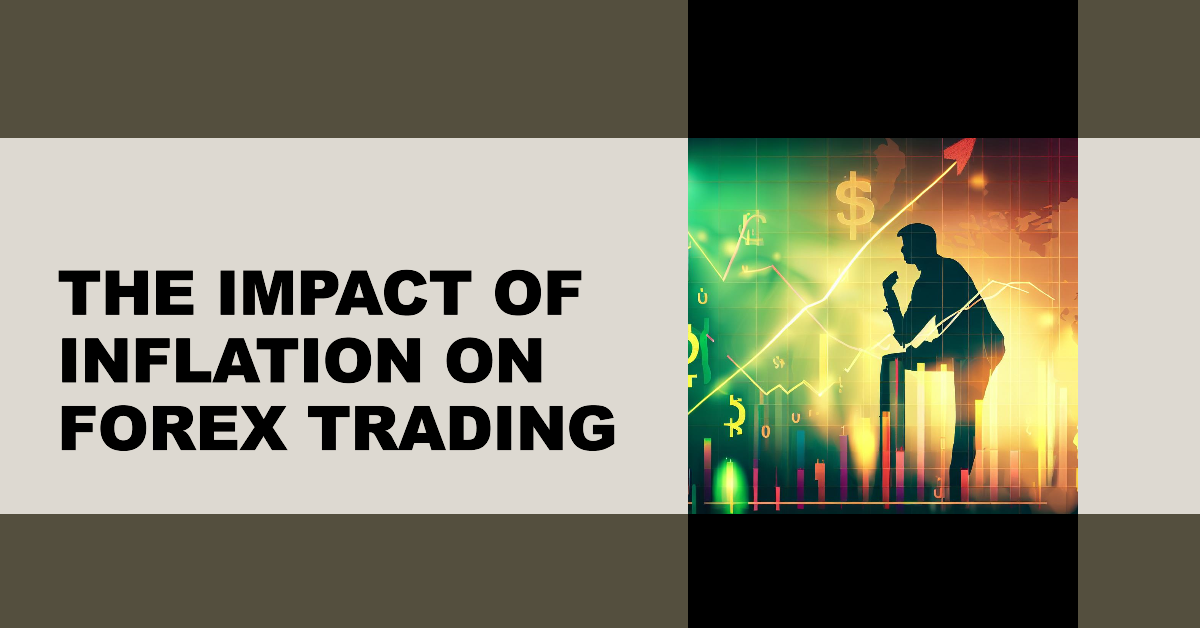
Forex Trading and the Impact of Inflation: A Comprehensive Guide
- Jonny Smith
- July 1, 2023
- Forex Trading For Beginners
- Best_forex_broker, ECN_Forex, forex, inflation, strategies
- 0 Comments
Hello again, valiant voyagers of the volatile Forex seas!
Today, we’re on a quest to uncover the mysteries of inflation and discern its far-reaching impact on Forex trading. So, don your explorer’s hat and join us as we embark on this thrilling journey through the realm of economics! 🌐🕵️♀️
Demystifying Inflation: The Ghost in the Economic Machine 🌐👻
Let’s initiate our exploration by understanding what inflation truly is. Simply put, inflation is the rate at which prices for goods and services climb, resulting in the gradual eroding of purchasing power. It’s akin to a phantom pickpocket, sneakily diminishing the value of every dollar, euro, or yen in your pocket. 💰🔥
Healthy inflation is a sign of a prospering economy. Central banks like the U.S. Federal Reserve strive to maintain the Goldilocks zone of inflation – not too high and not too low. However, erratic fluctuations or extreme levels of inflation can cause ripples throughout the Forex market. But what’s the connection between inflation and Forex? Let’s investigate! 🔎👀
Dancing with Inflation: The Ballet of Forex and Interest Rates 🎭📈
The link between inflation and Forex trading lies primarily in its relationship with interest rates. Here’s the crux: central banks adjust interest rates to control inflation. Higher inflation calls for increased interest rates to quell excessive spending. Meanwhile, lower inflation encourages central banks to decrease interest rates, stimulating spending and boosting inflation.
But why does it matter to us, the brave Forex explorers? High-interest rates attract foreign investors seeking lucrative returns, which boosts the demand and consequently, the value of a country’s currency. In contrast, low-interest rates may dissuade investors, causing the currency to depreciate. 📉📈
Let’s illuminate this with an example. If the U.S. Federal Reserve hikes interest rates to curb inflation, foreign investments might surge in the U.S., propelling the demand and value of the U.S. Dollar. Consequently, currency pair values in the Forex market may experience significant changes. 💵🔄
So, understanding the choreography between inflation, interest rates, and Forex can be akin to mastering an intricate dance. Sync with the rhythm, and you can elegantly waltz your way through the Forex market! 💃🕺

Peering into the Crystal Ball: The Role of Inflation Expectations 🔮🌐
Not just the actual inflation rates, but expectations of inflation also hold sway over Forex markets. This is because Forex markets, like a seasoned fortune teller, look forward, responding to anticipated economic scenarios.
For example, if traders anticipate a rise in inflation in the European Union, they might start speculating an increase in interest rates by the European Central Bank. This could trigger an uptick in the demand for the Euro, causing its value in the Forex market to appreciate even before the actual inflation data rolls out. 👀🔮
When Inflation Goes Extreme: The Specter of Hyperinflation 🌪️💣
While moderate inflation is a sign of a healthy economy, hyperinflation represents an economic tempest. It is an extremely rapid or out-of-control inflation, typically exceeding 50% per month. It can cause a sharp devaluation of a country’s currency, leading to notable swings in Forex markets.
Zimbabwe’s economic ordeal in the late 2000s provides a stark example of hyperinflation. With inflation rates soaring to astronomical heights, the value of the Zimbabwean dollar collapsed, marking a tumultuous period in the Forex market. 📉💥
Charting the Forex Course: Inflation-Informed Strategies and Tips 🗺️📝
To navigate the capricious seas of Forex markets amidst shifting inflation tides, here are a few strategies:
- Track Economic Indicators: Monitor indicators like the Consumer Price Index (CPI) and Producer Price Index (PPI) to glean insights into inflation trends. ⏱️📈
- Follow Central Bank Decisions: Stay updated with central banks’ monetary policy decisions to forecast potential shifts in the Forex market. 📰🔔
- Diversify Your Portfolio: Cast a wide net in the Forex sea by trading in various currency pairs. This diversification can cushion against potential inflation-related risks. 🌐💰
Interpreting the Sentiments of Central Banks 📢💡
Inflation is often viewed as the chief adversary of central banks, and their public statements provide invaluable cues for Forex traders. When a central bank chief voices “worries over inflation”, the Forex trading community instantly takes note.
These comments can prompt speculation within the market regarding potential shifts in monetary policy to counter inflation. This could entail hiking interest rates, which subsequently impacts the value of that nation’s currency in the Forex market.
For instance, if the Federal Reserve pronounces an interest rate that surpasses expectations in an effort to tackle inflation, it could spark a rise in the value of the US dollar against other currencies. Hence, comprehending and deciphering the sentiments of central banks is a crucial proficiency for Forex trading.
Inflation’s Implications on Currency Pairs 🔄💰
It’s pivotal to grasp that inflation can distinctly affect various currency pairs. Let’s say inflation accelerates in the US, prompting the Federal Reserve to increase interest rates. In such a scenario, this could lead to a surge in the value of the US dollar against currencies from nations where inflation is under control, and interest rates are steady or on a decline.
Therefore, a detailed awareness of inflation trends across different nations can aid traders in making informed decisions regarding which currency pairs to trade. It’s important to note that in Forex trading, it’s not just about understanding standalone currencies, but also the relative interplay between them.
Inflation’s Ripple Effect Across the Globe 🌎🔥
In our interconnected global economy, inflation in a single country can create waves that resonate globally, impacting other nations and their currencies. Suppose that high inflation in a powerhouse economy like the US or China leads to elevated interest rates, which then lures foreign capital. In this context, currencies of emerging economies might weaken if investors withdraw their capital in search of higher returns in the powerhouse economy.
Consequently, inflation’s influence isn’t confined to the Forex markets of the countries directly experiencing it. The domino effects can instigate fluctuations in currency values globally, generating potential risks as well as opportunities for Forex traders.
Navigating Inflation in Your Forex Trading Journey 🚀📈
In the continually shifting landscape of Forex trading, staying updated with economic trends, including inflation, is a vital component of a triumphant strategy. Being well-versed with inflation and its prospective impact on currency values can enable you to steer the market more effectively and formulate more strategic trading decisions.
From identifying the red flags of inflation in economic reports to understanding the steps taken by central banks to curb it, gaining proficiency in the complexities of inflation can arm you with the knowledge needed to embark on your Forex trading voyage.
As we part ways until our next economic exploration, remember to keep your strategy fine-tuned, your knowledge current, and your gaze fixed on the horizon. Wishing you profitable trading!
Proactive Learning and Application 🧠📚💡
In the constantly changing environment of Forex markets, the phrase “knowledge is power” truly comes to life. The more well-versed you are with key macroeconomic indicators such as inflation, the more prepared you are to make proactive and informed trading decisions.
It’s important to not just understand the concept of inflation, but also to know where to find relevant information, and how to interpret and apply it. Data on inflation is typically released in economic reports published by government departments or central banks. These can be accessed through their official websites, financial news outlets, and often, through your Forex trading platform.
Consistently keeping tabs on this data and studying the market’s response to different inflation levels can give you a good sense of how to potentially position your trades. It’s equally important to study not just the absolute inflation numbers, but also whether the data meets, falls short of, or exceeds market expectations, as these can trigger significant market reactions.
Conclusion: Inflation – A Key Part of the Forex Puzzle 🧩💹
Forex trading is often likened to solving a complex puzzle. The ability to understand and anticipate the impact of inflation can certainly give you a major piece of this puzzle. It is essential not only in predicting potential future movements in currency pairs but also in understanding and interpreting current market dynamics.
Remember, inflation is just one of many factors influencing currency values and Forex market trends. Always use this information in conjunction with other relevant economic indicators and factors.
By staying informed and adaptable, you can turn inflation from a potential risk into an opportunity. Keep learning, stay disciplined, and always be prepared to adjust your strategies according to the market dynamics. Until our next deep dive into the intricacies of the Forex market, trade wisely and profitably!








